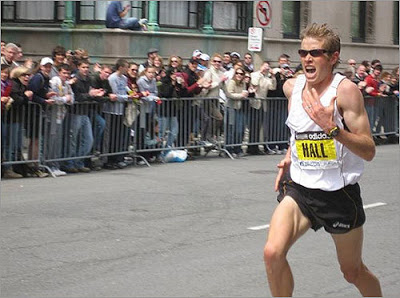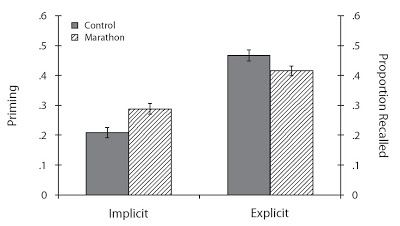Neuroscience

Third place finisher Ryan Hall at the 2009 Boston Marathon.
Photo courtesy of Martin Checkoway.
Running a 26.2 mile marathon is an exhausting endeavor for anyone, from the top Ethiopian and Kenyan runners to the astounding 75 year old Jim Schleisman (who finished in 3:45:33) to the back of the packcasual joggers runners. Two psychologists from Columbia university reckoned that the physical stress of marathon running might result in cognitive impairments (Eich & Metcalfe, 2009). Although the benefits of moderate aerobic exercise are well-documented, levels of cortisol [a "stress hormone" produced by the adrenal glands] after strenuous marathon running are four times greater than those observed after laboratory-based stress induction paradigms.
So would completing a marathon differentially affect explicit and implicit memory? The authors predicted the following:
FRAGILE
BREAD
APPLE
BLANKET...APP_________
CHA_________
BLA_________
STI_________
STR_________
FRA_________
BRE_________
DEL_________
The results below illustrate that a dissociation between the two forms of memory was observed.

Figure 1 (Eich & Metcalfe, 2009). Performance on the implicit and explicit memory tasks. The left bars give the difference between the control (premarathon) and marathon (postmarathon) groups on the implicit memory word-stem completion task. The right bars give control group and marathon group performance on the explicit cued recall task. Priming is the difference in the proportions of correctly completed presented and unpresented (baseline) words.
As predicted, there was a significant decline in explicit memory after running a marathon. Less expected (but still not a complete surprise) was an increase in performance on the implicit memory task. The authors
Footnote
1 But see Berry et al., 2008 for the opposing view that explicit and implicit memory are not independent and dissociable forms of memory.
References
Berry CJ, Shanks DR, Henson RN. (2008). A unitary signal-detection model of implicit and explicit memory. Trends Cog Sci. 12:367-73.
Brunner R, Schaefer D, Hess K, Parzer P, Resch F, Schwab S. (2006). Effect of high-dose cortisol on memory functions. Ann N Y Acad Sci. 1071:434-7.

Eich, T., & Metcalfe, J. (2009). Effects of the stress of marathon running on implicit and explicit memory Psychonomic Bulletin & Review, 16 (3), 475-479 DOI: 10.3758/PBR.16.3.475
Squire LR. (2004). Memory systems of the brain: a brief history and current perspective. Neurobiol Learn Mem. 82:171-7.
- Want To Remember Something? Draw It
If you've got some revision to do, get yourself a sketch pad and start drawing out the words or concepts that you want to remember. That's the clear message from a series of studies in the Quarterly Journal of Experimental Psychology that demonstrates...
- Marathon Runners Forget How Painful It Was
Image: Flickr/GregThe sense of accomplishment from running a marathon is hugely uplifting. But let's not romanticise it, there's also a lot of pain involved. Despite this, many people pull on their running shoes time and again. A new study helps...
- Extras
Eye-catching studies that didn't make the final cut: Attentional blink transfers from one hemisphere to another, even in a split-brain patient with a severed corpus callosum. No evidence for neuropsychological impairment among university football...
- I Predict . . . Mindreading In The News
Note the difference below between the BBC headline and the next couple of sentences: Scientists 'can predict memories' Scientists say it may be possible to predict how well we will remember something before the event has even taken place. By...
- Hyponatremia
Study Cautions Runners to Limit Their Water Intake The New York Times By GINA KOLATA Published: April 14, 2005 After years of telling athletes to drink as much liquid as possible to avoid dehydration, some doctors are now saying that drinking too much...
Neuroscience
I Just Finished the Boston Marathon! (but I can't remember your name)

Third place finisher Ryan Hall at the 2009 Boston Marathon.
Photo courtesy of Martin Checkoway.
Running a 26.2 mile marathon is an exhausting endeavor for anyone, from the top Ethiopian and Kenyan runners to the astounding 75 year old Jim Schleisman (who finished in 3:45:33) to the back of the pack
Indeed, cortisol levels recorded 30 min after completion of a marathon rival those reported in military training and interrogation (Taylor et al., 2007), rape victims being treated acutely (Resnick, Yehuda, Pitman, & Foy, 1995), severe burn injury patients (Norbury, Herndon, Branski, Chinkes, & Jeschke, 2008), and first-time parachute jumpers (Aloe et al., 1994).Thus, along with parachute jumping, marathon running presents an ethical opportunity for studying the effects of extreme cortisol levels on cognitive processing. In particular, cortisol may disrupt hippocampal function and explicit memory -- the conscious recollection of previously learned information (Brunner et al., 2008). In contrast, implicit memory is thought to be unconscious and independent of the hippocampus, as demonstrated in studies of amnesic patients where impairments in explicit memory are accompanied by intact implicit memory performance (Squire, 2004).1
So would completing a marathon differentially affect explicit and implicit memory? The authors predicted the following:
Our hypothesis was that when marathon runners had just undergone the stress of running a marathon as compared with several days earlier, their performance on the explicit cued recall task would be impaired. At the same time, we predicted that their performance on the implicit stem-completion task would be spared or might even be enhanced.The participants were 261 individuals who had completed either the New York City Marathon or the Boston Marathon: 141 were tested within 30 min of finishing, while the other 120 were tested 1-3 days before the race. All participants were given an implicit memory test (word stem completion) and an explicit memory test (word stem cued recall). Both tasks involve studying a list of words, followed by a series of 3-letter word stems. The instructions dictated which form of memory was to be evaluated, as described in the Procedure:
Participants rated 26 words for pleasantness on a 5-point scale. Text on the second page informed participants that each of the cues on the subsequent page would be the beginning of an English word. Their task would be to write a few letters to make each cue into any English word, but they were instructed to write down the first one that came to mind. The next page, which presented the implicit word-stem completion task, contained word stems from 13 words that were previously rated for pleasantness as well as stems from 13 unrated (baseline) words, randomly intermixed. Following completion of the implicit memory task, participants were given instructions for the explicit memory cued recall task. They were told that each of the cues on the subsequent page was the beginning of a word for which they had provided a pleasantness rating earlier. They were instructed to try to complete each cue with the word from the pleasantness-rating list—that is, to explicitly remember the previously rated words. They were also instructed not to look back at the list. After reading these instructions, they turned to the last page, which contained the 13 remaining three-letter word stems presented in a random order, all of which they had previously rated for pleasantness. Given the cues, they then attempted to recall the words.The brief example below gives a list of words seen during the study phase, followed by a series of word stems that are either completed with the first word that comes to mind (implicit memory), or used as cues to recall words from the study phase (explicit memory).
FRAGILE
BREAD
APPLE
BLANKET...APP_________
CHA_________
BLA_________
STI_________
STR_________
FRA_________
BRE_________
DEL_________
The results below illustrate that a dissociation between the two forms of memory was observed.

Figure 1 (Eich & Metcalfe, 2009). Performance on the implicit and explicit memory tasks. The left bars give the difference between the control (premarathon) and marathon (postmarathon) groups on the implicit memory word-stem completion task. The right bars give control group and marathon group performance on the explicit cued recall task. Priming is the difference in the proportions of correctly completed presented and unpresented (baseline) words.
As predicted, there was a significant decline in explicit memory after running a marathon. Less expected (but still not a complete surprise) was an increase in performance on the implicit memory task. The authors
interpret the results as suggesting that complex neuromodulation associated with extreme stress enhances some brain systems and inhibits others... As we acknowledged in our introduction, marathon running results in a host of other physiological changes [beyond increased cortisol], some of which may lead to decrements in explicit memory. However, consideration of those factors alone provides no obvious explanation as to why marathon running led to improved implicit memory.Nevertheless, do they have a tentative conclusion about why that happened?
...Stress hormones, including norepinephrine, endorphins, and others, are surging in marathon runners. It is not unreasonable to suppose that these hormones serve to improve certain kinds of mental function.But don't even try to remember where you parked your car...
Footnote
1 But see Berry et al., 2008 for the opposing view that explicit and implicit memory are not independent and dissociable forms of memory.
References
Berry CJ, Shanks DR, Henson RN. (2008). A unitary signal-detection model of implicit and explicit memory. Trends Cog Sci. 12:367-73.
Brunner R, Schaefer D, Hess K, Parzer P, Resch F, Schwab S. (2006). Effect of high-dose cortisol on memory functions. Ann N Y Acad Sci. 1071:434-7.

Eich, T., & Metcalfe, J. (2009). Effects of the stress of marathon running on implicit and explicit memory Psychonomic Bulletin & Review, 16 (3), 475-479 DOI: 10.3758/PBR.16.3.475
Squire LR. (2004). Memory systems of the brain: a brief history and current perspective. Neurobiol Learn Mem. 82:171-7.
- Want To Remember Something? Draw It
If you've got some revision to do, get yourself a sketch pad and start drawing out the words or concepts that you want to remember. That's the clear message from a series of studies in the Quarterly Journal of Experimental Psychology that demonstrates...
- Marathon Runners Forget How Painful It Was
Image: Flickr/GregThe sense of accomplishment from running a marathon is hugely uplifting. But let's not romanticise it, there's also a lot of pain involved. Despite this, many people pull on their running shoes time and again. A new study helps...
- Extras
Eye-catching studies that didn't make the final cut: Attentional blink transfers from one hemisphere to another, even in a split-brain patient with a severed corpus callosum. No evidence for neuropsychological impairment among university football...
- I Predict . . . Mindreading In The News
Note the difference below between the BBC headline and the next couple of sentences: Scientists 'can predict memories' Scientists say it may be possible to predict how well we will remember something before the event has even taken place. By...
- Hyponatremia
Study Cautions Runners to Limit Their Water Intake The New York Times By GINA KOLATA Published: April 14, 2005 After years of telling athletes to drink as much liquid as possible to avoid dehydration, some doctors are now saying that drinking too much...
